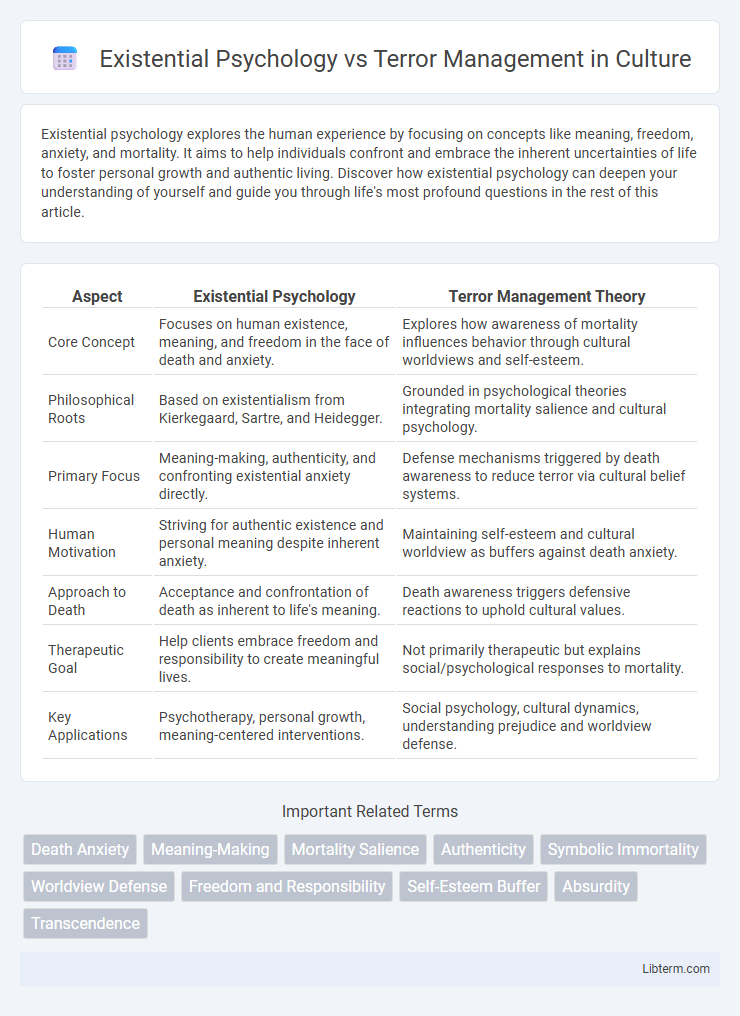Existential psychology explores the human experience by focusing on concepts like meaning, freedom, anxiety, and mortality. It aims to help individuals confront and embrace the inherent uncertainties of life to foster personal growth and authentic living. Discover how existential psychology can deepen your understanding of yourself and guide you through life's most profound questions in the rest of this article.
Table of Comparison
| Aspect | Existential Psychology | Terror Management Theory |
|---|---|---|
| Core Concept | Focuses on human existence, meaning, and freedom in the face of death and anxiety. | Explores how awareness of mortality influences behavior through cultural worldviews and self-esteem. |
| Philosophical Roots | Based on existentialism from Kierkegaard, Sartre, and Heidegger. | Grounded in psychological theories integrating mortality salience and cultural psychology. |
| Primary Focus | Meaning-making, authenticity, and confronting existential anxiety directly. | Defense mechanisms triggered by death awareness to reduce terror via cultural belief systems. |
| Human Motivation | Striving for authentic existence and personal meaning despite inherent anxiety. | Maintaining self-esteem and cultural worldview as buffers against death anxiety. |
| Approach to Death | Acceptance and confrontation of death as inherent to life's meaning. | Death awareness triggers defensive reactions to uphold cultural values. |
| Therapeutic Goal | Help clients embrace freedom and responsibility to create meaningful lives. | Not primarily therapeutic but explains social/psychological responses to mortality. |
| Key Applications | Psychotherapy, personal growth, meaning-centered interventions. | Social psychology, cultural dynamics, understanding prejudice and worldview defense. |
Introduction to Existential Psychology
Existential Psychology explores the human condition by addressing fundamental concerns such as meaning, freedom, isolation, and mortality. It emphasizes the individual's experience and the quest for authentic existence amid life's inherent uncertainties. This approach provides a framework for understanding anxiety as a natural response to the awareness of death, which forms a foundation for Terror Management Theory's exploration of cultural worldviews and self-esteem as buffers against existential dread.
Core Principles of Existential Psychology
Existential psychology centers on individual existence, freedom, and the search for meaning, emphasizing authentic living in the face of anxiety and death. Core principles include confronting existential givens such as mortality, isolation, freedom, and meaninglessness to foster personal growth and self-awareness. Terror Management Theory contrasts by exploring how cultural worldviews and self-esteem buffer death anxiety, while existential psychology prioritizes embracing existential realities to achieve psychological resilience.
Understanding Terror Management Theory
Terror Management Theory (TMT) explores how humans cope with the existential fear of death by clinging to cultural worldviews, self-esteem, and symbolic immortality. Unlike Existential Psychology, which broadly addresses human existence, meaning, and authenticity, TMT specifically examines defensive mechanisms triggered by mortality salience. Research shows that reminders of death heighten individuals' adherence to their cultural beliefs and increase anxiety-buffering behaviors, providing empirical support for TMT's framework on managing existential terror.
Key Concepts in Terror Management
Terror Management Theory centers on the psychological conflict resulting from humans' awareness of mortality, emphasizing key concepts such as mortality salience, which triggers existential anxiety and motivates behavior aimed at preserving self-esteem and cultural worldviews. The theory highlights defense mechanisms including cultural worldview reinforcement and self-esteem striving, which serve to buffer death-related anxiety and maintain psychological well-being. Research in Terror Management illustrates how reminders of death influence social attitudes, increase in-group favoritism, and adherence to cultural norms, differentiating it from broader existential psychology that addresses meaning, freedom, isolation, and death without the specific focus on mortality-driven anxiety management.
Historical Origins: Existentialism and TMT
Existential Psychology traces its origins to early 20th-century philosophers like Soren Kierkegaard and Friedrich Nietzsche, emphasizing individual meaning, freedom, and death awareness. Terror Management Theory (TMT) emerged in the 1980s from social psychologists Jeff Greenberg, Tom Pyszczynski, and Sheldon Solomon, building on Ernest Becker's work linking death anxiety to cultural worldviews. Both frameworks address human responses to mortality but differ in their historical development and disciplinary roots.
Approaches to Death Anxiety
Existential psychology approaches death anxiety by encouraging individuals to confront the inevitability of mortality, fostering authentic living and personal meaning-making. Terror management theory emphasizes the psychological mechanisms, such as cultural worldviews and self-esteem, that people use to manage the fear of death. Both frameworks address death anxiety but differ by existential psychology promoting acceptance of mortality, while terror management focuses on defensive strategies to mitigate existential terror.
Meaning-Making Processes: A Comparative View
Existential psychology explores meaning-making by emphasizing individual freedom, responsibility, and authentic existence as responses to life's inherent uncertainties. Terror Management Theory (TMT) focuses on meaning-making through the psychological mechanisms that manage fear of death by bolstering cultural worldviews and self-esteem. Both frameworks address how humans create and maintain meaning but differ in their emphasis on personal authenticity versus collective defense against existential anxiety.
Influence on Mental Health Interventions
Existential psychology emphasizes confronting core human concerns like freedom, meaning, and mortality to promote authentic living and emotional resilience. Terror Management Theory explores how fear of death drives behavior and coping mechanisms, influencing anxiety and self-esteem regulation within therapeutic settings. Integrating these perspectives enhances mental health interventions by addressing underlying existential anxieties and fostering adaptive meaning-making processes.
Criticisms and Debates: Existential vs. TMT
Existential Psychology emphasizes individual meaning-making and authentic existence, often criticized for its abstract concepts and limited empirical support. Terror Management Theory (TMT) focuses on how awareness of mortality influences behavior, facing debate over its reductionist tendencies and reliance on experimental paradigms. Scholars argue TMT overlooks existential psychology's depth, while existential critics question TMT's narrow scope in addressing human motivation beyond death anxiety.
Integrating Perspectives for Future Research
Existential psychology explores how individuals confront inherent anxieties about existence, meaning, and mortality, while terror management theory (TMT) examines how cultural worldviews buffer death-related fears. Integrating these perspectives can enrich future research by combining existential themes of personal authenticity and meaning with empirical insights from TMT on defensive mechanisms against death anxiety. This synthesis offers a comprehensive framework to better understand human motivation, resilience, and the psychological processes underlying coping with existential threats.
Existential Psychology Infographic

 libterm.com
libterm.com